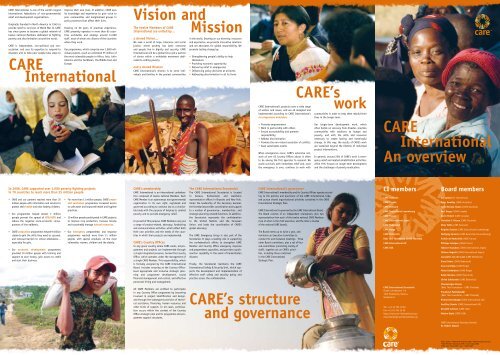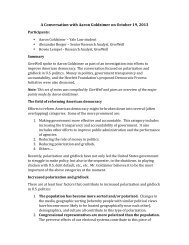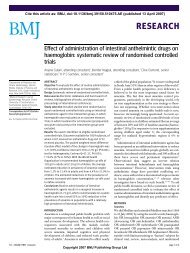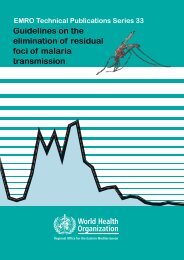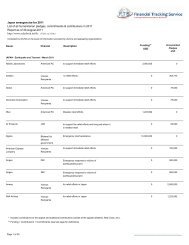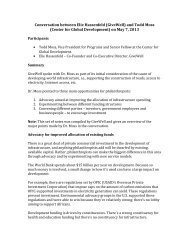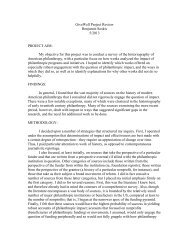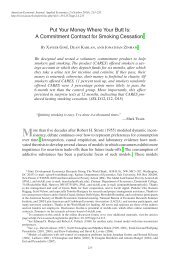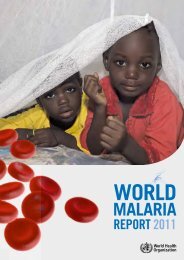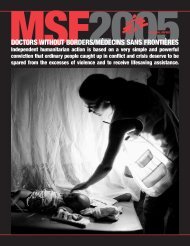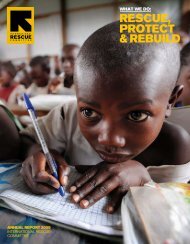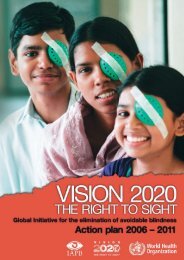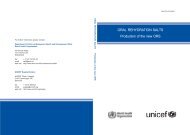CARE International An overview CARE's structure and ... - GiveWell
CARE International An overview CARE's structure and ... - GiveWell
CARE International An overview CARE's structure and ... - GiveWell
Create successful ePaper yourself
Turn your PDF publications into a flip-book with our unique Google optimized e-Paper software.
<strong>CARE</strong> <strong>International</strong> is one of the world’s largest<br />
international federations of non-governmental<br />
relief <strong>and</strong> development organisations.<br />
Originally founded in North America in 1945 to<br />
provide relief to survivors of World War II, <strong>CARE</strong><br />
has since grown to become a global network of<br />
twelve national Members dedicated to fighting<br />
poverty <strong>and</strong> discrimination around the world.<br />
<strong>CARE</strong> is independent, non-political <strong>and</strong> nonsectarian,<br />
<strong>and</strong> uses its expertise to respond to<br />
disasters <strong>and</strong> to help poor people take steps to<br />
<strong>CARE</strong><br />
improve their own lives. In addition, <strong>CARE</strong> uses<br />
its knowledge <strong>and</strong> experience to give voice to<br />
poor communities <strong>and</strong> marginalised groups in<br />
policy processes that affect their lives.<br />
Drawing on 60 years of practical experience,<br />
<strong>CARE</strong> presently operates in more than 65 countries<br />
worldwide, <strong>and</strong> employs around 14,000<br />
staff, most of whom are citizens of the countries<br />
where they work.<br />
Our programmes, which comprise over 1,000 individual<br />
projects, reach an estimated 55 million of<br />
the most vulnerable people in Africa, Asia, Latin<br />
America <strong>and</strong> the Caribbean, the Middle East <strong>and</strong><br />
Europe.<br />
<strong>International</strong><br />
The twelve Members of <strong>CARE</strong><br />
<strong>International</strong> are united by…<br />
a shared Vision…<br />
We seek a world of hope, tolerance <strong>and</strong> social<br />
justice, where poverty has been overcome<br />
<strong>and</strong> people live in dignity <strong>and</strong> security. <strong>CARE</strong><br />
<strong>International</strong> will be a global force <strong>and</strong> a partner<br />
of choice within a worldwide movement dedicated<br />
to ending poverty.<br />
<strong>and</strong> a shared Mission<br />
<strong>CARE</strong> <strong>International</strong>’s mission is to serve individuals<br />
<strong>and</strong> families in the poorest communities<br />
in the world. Drawing on our diversity, resources<br />
<strong>and</strong> experience, we promote innovative solutions<br />
<strong>and</strong> are advocates for global responsibility. We<br />
promote lasting change by:<br />
• Strengthening people’s ability to help<br />
themselves<br />
• Providing economic opportunity<br />
• Delivering relief in emergencies<br />
• Influencing policy decisions at all levels<br />
• Addressing discrimination in all its forms<br />
<strong>CARE</strong> <strong>International</strong>’s projects cover a wide range<br />
of sectors <strong>and</strong> issues, <strong>and</strong> are all designed <strong>and</strong><br />
implemented according to <strong>CARE</strong> <strong>International</strong>’s<br />
six programme principles:<br />
• Promote empowerment<br />
• Work in partnership with others<br />
• Ensure accountability <strong>and</strong> promote<br />
responsibility<br />
• Address discrimination<br />
• Promote the non-violent resolution of conflicts<br />
• Seek sustainable results<br />
When emergencies occur, <strong>CARE</strong>’s extensive network<br />
of over 65 Country Offices allows it often<br />
to be among the first agencies to respond. We<br />
assist survivors with immediate relief <strong>and</strong>, once<br />
the emergency is over, continue to work with<br />
communities in order to help them rebuild their<br />
lives in the longer-term.<br />
Our longer-term development work, which<br />
often builds on recovery from disaster, provides<br />
communities with solutions to hunger <strong>and</strong><br />
poverty, <strong>and</strong> with the skills <strong>and</strong> resources<br />
necessary to create lasting <strong>and</strong> meaningful<br />
change. In this way, the results of <strong>CARE</strong>’s work<br />
are sustained beyond the lifetime of individual<br />
project interventions.<br />
In general, around 25% of <strong>CARE</strong>’s work is emergency<br />
relief <strong>and</strong> related rehabilitation activities,<br />
while 75% focuses on longer-term development<br />
<strong>and</strong> the challenges of poverty eradication.<br />
<strong>CARE</strong><br />
<strong>International</strong><br />
<strong>An</strong> <strong>overview</strong><br />
In 2008, <strong>CARE</strong> supported over 1,000 poverty-fighting projects<br />
in 70 countries to reach more than 55 million people<br />
• <strong>CARE</strong> <strong>and</strong> our partners reached more than 35<br />
million people with information <strong>and</strong> services to<br />
protect their health <strong>and</strong> raise healthy children.<br />
• Our programmes helped almost 7 million<br />
people prevent the spread of HIV/AIDS <strong>and</strong><br />
reduce the negative socio-economic consequences<br />
of the epidemic.<br />
• <strong>CARE</strong>’s education programmes helped 9 million<br />
students gain the skills they need to succeed,<br />
<strong>and</strong> removed barriers to school attendance –<br />
especially for girls.<br />
• Our economic development programmes<br />
provided 10 million people with training <strong>and</strong><br />
support to save money, gain access to credit<br />
<strong>and</strong> start their business.<br />
• For more than 11 million people, <strong>CARE</strong>’s water<br />
<strong>and</strong> sanitation programmes increased access<br />
to safe water <strong>and</strong> improved health <strong>and</strong> hygiene<br />
practices.<br />
• 10 million people participated in <strong>CARE</strong> projects<br />
to improve crop production, increase income<br />
<strong>and</strong> sustainably manage natural resources.<br />
• Our emergency preparedness <strong>and</strong> response<br />
programmes reached more than 11 million<br />
people, with special emphasis on the most<br />
vulnerable: women, children <strong>and</strong> the elderly.<br />
<strong>CARE</strong>’s membership<br />
<strong>CARE</strong> <strong>International</strong> is an international confederation<br />
composed of twelve national Members. Each<br />
<strong>CARE</strong> Member is an autonomous non-governmental<br />
organisation in its own right, registered <strong>and</strong><br />
governed according to national law as a charitable<br />
body with the purpose of helping to combat<br />
poverty <strong>and</strong> to provide emergency relief.<br />
In pursuit of this purpose, <strong>CARE</strong> Members carry out<br />
a range of project-related, advocacy, fundraising<br />
<strong>and</strong> communications activities, which reflect both<br />
their own priorities <strong>and</strong> the needs of the countries<br />
in which their projects are implemented.<br />
<strong>CARE</strong>’s Country Offices<br />
In any given country where <strong>CARE</strong> works, all programmes<br />
<strong>and</strong> projects are implemented through<br />
a single integrated presence, termed the Country<br />
Office, which operates under the management of<br />
a single <strong>CARE</strong> Member. This responsibility, which<br />
is formally assigned by the <strong>CARE</strong> <strong>International</strong><br />
Board, includes ensuring at the Country Officelevel<br />
appropriate <strong>and</strong> inclusive strategic planning<br />
<strong>and</strong> programme development, sound<br />
financial management <strong>and</strong> control, <strong>and</strong> effective<br />
personnel hiring <strong>and</strong> management.<br />
All <strong>CARE</strong> Members are entitled to participate<br />
in any Country Office programme by becoming<br />
involved in project identification <strong>and</strong> design,<br />
<strong>and</strong> through the subsequent provision of technical<br />
assistance, financing, human resources <strong>and</strong><br />
other kinds of support. In all cases, participation<br />
occurs within the context of the Country<br />
Office strategic plan <strong>and</strong> its programme <strong>and</strong> programme<br />
support <strong>structure</strong>s.<br />
The <strong>CARE</strong> <strong>International</strong> Secretariat<br />
The <strong>CARE</strong> <strong>International</strong> Secretariat is located<br />
in Geneva, Switzerl<strong>and</strong>, <strong>and</strong> maintains<br />
representative offices in Brussels <strong>and</strong> New York.<br />
Under the leadership of the Secretary General,<br />
the Secretariat provides coordination <strong>and</strong> support<br />
to a number of governance-, membership-, <strong>and</strong><br />
strategic planning-related functions. In addition,<br />
the Secretariat represents the confederation<br />
to the United Nations <strong>and</strong> the European<br />
Union, <strong>and</strong> leads the coordination of <strong>CARE</strong>’s<br />
global advocacy.<br />
The <strong>CARE</strong> Emergency Group is also part of the<br />
Secretariat. It plays a leading role in supporting<br />
the confederation’s efforts to strengthen <strong>CARE</strong><br />
Member <strong>and</strong> Country Office emergency response<br />
<strong>and</strong> preparedness capacities, <strong>and</strong> provides a quickreaction<br />
capability in the event of humanitarian<br />
disaster.<br />
Finally, the Secretariat maintains the <strong>CARE</strong><br />
<strong>International</strong> Safety & Security Unit, which supports<br />
the development <strong>and</strong> implementation of<br />
effective staff safety <strong>and</strong> security policy <strong>and</strong><br />
practice across the confederation.<br />
<strong>CARE</strong> <strong>International</strong>’s governance<br />
<strong>CARE</strong> <strong>International</strong>’s membership <strong>and</strong> its Country Offices operate according<br />
to the policies <strong>and</strong> provisions of the <strong>CARE</strong> <strong>International</strong> Code,<br />
<strong>and</strong> pursue shared organisational priorities contained in the <strong>CARE</strong><br />
<strong>International</strong> Strategic Plan.<br />
<strong>CARE</strong> <strong>International</strong> is governed by the <strong>CARE</strong> <strong>International</strong> Board.<br />
The Board consists of an independent chairperson, plus two<br />
representatives from each of the twelve national <strong>CARE</strong> Members<br />
(one of whom is the chief executive, <strong>and</strong> the other a trustee<br />
of the national <strong>CARE</strong> board).<br />
The Board meets up to twice a year, <strong>and</strong><br />
maintains an Executive Committee to<br />
conduct its work between meetings. Three<br />
other Board committees, plus a set of four<br />
sub-committees (consisting mainly of<br />
staff), together act on <strong>CARE</strong>’s priorities,<br />
including those contained<br />
in the <strong>CARE</strong> <strong>International</strong><br />
Strategic Plan.<br />
<strong>CARE</strong>’s <strong>structure</strong><br />
<strong>and</strong> governance<br />
CI members<br />
<strong>CARE</strong> Australia<br />
<strong>CARE</strong> Canada<br />
<strong>CARE</strong> Danmark<br />
<strong>CARE</strong> Deutschl<strong>and</strong>-Luxembourg<br />
<strong>CARE</strong> France<br />
<strong>CARE</strong> <strong>International</strong> Japan<br />
<strong>CARE</strong> Nederl<strong>and</strong><br />
<strong>CARE</strong> Norge<br />
<strong>CARE</strong> Österreich<br />
Raks Thai Foundation (<strong>CARE</strong> Thail<strong>and</strong>)<br />
<strong>CARE</strong> <strong>International</strong> UK<br />
<strong>CARE</strong> USA<br />
<strong>CARE</strong> <strong>International</strong> Secretariat<br />
Chemin de Balexert 7-9<br />
1219 Chatelaine / Geneva<br />
Switzerl<strong>and</strong><br />
Tél.: +41 22 795 10 20<br />
Fax: +41 22 795 10 29<br />
http://www.care-international.org/<br />
cisecretariat@careinternational.org<br />
Board members<br />
Eva Lystad (CI Chairperson)<br />
Peter Smedley (<strong>CARE</strong> Australia)<br />
Julia Newton-Howes (<strong>CARE</strong> Australia)<br />
Paul Drager (<strong>CARE</strong> Canada)<br />
Kevin McCort (<strong>CARE</strong> Canada)<br />
Christian S. Nissen (<strong>CARE</strong> Danmark)<br />
Niels Tofte (<strong>CARE</strong> Danmark)<br />
Brigitte Schulte (<strong>CARE</strong> Deutschl<strong>and</strong>-Luxembourg)<br />
Wolfgang Jamann (<strong>CARE</strong> Deutschl<strong>and</strong>-Luxembourg)<br />
Arielle de Rothschild (<strong>CARE</strong> France)<br />
Philippe Lévêque (<strong>CARE</strong> France)<br />
Takanori Kazuhara (<strong>CARE</strong> <strong>International</strong> Japan)<br />
Chitose Noguchi (<strong>CARE</strong> <strong>International</strong> Japan)<br />
Lousewies van der Laan (<strong>CARE</strong> Nederl<strong>and</strong>)<br />
Guus Eskens (<strong>CARE</strong> Nederl<strong>and</strong>)<br />
Arne Cartridge (<strong>CARE</strong> Norge)<br />
Marte Gerhardsen (<strong>CARE</strong> Norge)<br />
Ralph Martens (<strong>CARE</strong> Österreich)<br />
Ulrike Schel<strong>and</strong>er (<strong>CARE</strong> Österreich)<br />
Chanawongse Krasae<br />
(Raks Thai Foundation - <strong>CARE</strong> Thail<strong>and</strong>)<br />
Promboon Panitchpakdi<br />
(Raks Thai Foundation - <strong>CARE</strong> Thail<strong>and</strong>)<br />
Richard Greenhalgh (<strong>CARE</strong> <strong>International</strong> UK)<br />
Geoffrey Dennis (<strong>CARE</strong> <strong>International</strong> UK)<br />
Kenneth Lehman (<strong>CARE</strong> USA)<br />
Helene Gayle (<strong>CARE</strong> USA)<br />
<strong>CARE</strong> <strong>International</strong> Secretary General:<br />
Dr. Robert Glasser<br />
Photo credits: ©2006 David Rochkind/<strong>CARE</strong>; ©2006 Georgina Cranston;<br />
©2007 Meredith Davenport/<strong>CARE</strong>; ©Josh Estey/<strong>CARE</strong>;<br />
©2006 Josh Estey/<strong>CARE</strong>; Cover: ©2008 <strong>CARE</strong>
World of <strong>CARE</strong><br />
I<br />
C<br />
K<br />
D<br />
H<br />
E<br />
F<br />
B<br />
67 66<br />
Africa<br />
1 <strong>An</strong>gola<br />
2 Benin<br />
3 Burundi<br />
4 Cameroon<br />
5 Chad<br />
6 Democratic Republic of Congo<br />
7 Ethiopia<br />
8 Ghana<br />
9 Ivory Coast<br />
10 Kenya<br />
11 Lesotho<br />
12 Liberia<br />
13 Madagascar<br />
14 Malawi<br />
15 Mali<br />
16 Morocco<br />
17 Mozambique<br />
18 Niger<br />
19 Rw<strong>and</strong>a<br />
20 Senegal<br />
21 Sierra Leone<br />
22 Somalia<br />
23 South Africa<br />
24 Sudan<br />
25 Tanzania<br />
26 Togo<br />
27 Ug<strong>and</strong>a<br />
28 Zambia<br />
29 Zimbabwe<br />
Asia<br />
30 Afghanistan<br />
31 Bangladesh<br />
32 Cambodia<br />
33 East Timor<br />
34 India*<br />
35 Indonesia<br />
36 Laos<br />
37 Myanmar<br />
38 Nepal<br />
39 Pakistan<br />
40 Papua New Guinea<br />
41 Philippines<br />
42 Sri Lanka<br />
43 Tajikistan<br />
44 Thail<strong>and</strong>**<br />
45 Vanuatu<br />
46 Vietnam<br />
Latin America<br />
<strong>and</strong> the Caribbean<br />
47 Bolivia<br />
48 Brazil*<br />
49 Cuba<br />
50 Ecuador<br />
51 El Salvador<br />
52 Guatemala<br />
53 Haiti<br />
54 Honduras<br />
55 Nicaragua<br />
56 Peru*<br />
Middle East<br />
<strong>and</strong> Europe<br />
57 Bosnia/Herzegovina<br />
58 Bulgaria<br />
59 Croatia<br />
60 Egypt<br />
61 Georgia<br />
62 Jordan<br />
63 Kosovo<br />
64 Lebanon<br />
65 Montenegro<br />
66 Romania<br />
67 Serbia<br />
68 Syria<br />
69 West Bank/Gaza<br />
70 Yemen<br />
<strong>CARE</strong> <strong>International</strong><br />
Member Countries<br />
A Australia<br />
B Austria<br />
C Canada<br />
D Denmark<br />
E France<br />
F Germany/Luxemburg<br />
G Japan<br />
H Netherl<strong>and</strong>s<br />
I Norway<br />
J Thail<strong>and</strong>**<br />
K United Kingdom<br />
L United States<br />
L<br />
52<br />
51<br />
54<br />
<strong>CARE</strong> <strong>International</strong> Members<br />
Countries with <strong>CARE</strong> Programming in 2008<br />
<strong>CARE</strong> <strong>International</strong> Secretariat<br />
(Geneva, Brussels, New York)<br />
49<br />
53<br />
55<br />
50<br />
56<br />
47<br />
48<br />
20<br />
21<br />
12<br />
55 million people served by<br />
<strong>CARE</strong> worldwide in 2008 (1)<br />
16<br />
9<br />
15<br />
8<br />
2<br />
26<br />
59 58<br />
57<br />
65<br />
63<br />
64<br />
69<br />
60<br />
18<br />
5<br />
24<br />
4<br />
27<br />
1<br />
59%<br />
31%<br />
6<br />
23<br />
19<br />
3<br />
Asia<br />
Africa<br />
28<br />
29<br />
25<br />
6%<br />
11<br />
4%<br />
61<br />
68<br />
7<br />
10<br />
62<br />
14<br />
17<br />
$850 million spent<br />
worldwide in 2008 (1)<br />
13<br />
Latin America<br />
<strong>and</strong> the Carribean<br />
Middle East<br />
<strong>and</strong> Europe<br />
22<br />
70<br />
30<br />
39<br />
43<br />
34<br />
42<br />
38<br />
31<br />
37<br />
J<br />
44 36<br />
32 46<br />
Donors<br />
35<br />
41<br />
33<br />
A<br />
G<br />
40<br />
<strong>CARE</strong> receives funding from a wide range of institutional, corporate <strong>and</strong><br />
individual donors around the world :<br />
• Hundreds of thous<strong>and</strong>s of private individuals support <strong>CARE</strong>’s work every year through<br />
monthly or one-off donations.<br />
• Our institutional donors include :<br />
- government donor agencies in most countries where <strong>CARE</strong> Members are based<br />
- some government agencies in countries hosting <strong>CARE</strong>’s Country Offices<br />
- multilateral organisations including the United Nations, the World Bank,<br />
the Global Fund <strong>and</strong> the European Union<br />
45<br />
Photo credits: ©2007 Jenny Matthews; ©2006 <strong>An</strong>ne Heslop; ©2007 <strong>CARE</strong>; ©Josh Estey/<strong>CARE</strong>; ©2005 Phil Borges; ©2006 Georgina Cranston;<br />
©Phil Borges/<strong>CARE</strong>; ©2006 Kate Holt; ©Jason Sangster/<strong>CARE</strong>; ©Josh Estey/<strong>CARE</strong>; Background picture: ©Tomas Schwarz/<strong>CARE</strong><br />
59%<br />
31%<br />
Asia<br />
Africa<br />
6%<br />
4%<br />
Latin America<br />
<strong>and</strong> the Carribean<br />
Middle East<br />
<strong>and</strong> Europe<br />
41% Africa<br />
10% Latin America<br />
<strong>and</strong> the Carribean<br />
26%<br />
Asia<br />
8%<br />
Support services<br />
8% Middle East<br />
7% Fundraising expenses<br />
<strong>and</strong> Europe<br />
• <strong>CARE</strong> also receives support from a large number of private grant-giving organisations<br />
(including private foundations) <strong>and</strong> corporate partners worldwide.<br />
*<strong>CARE</strong>s Brazil, India <strong>and</strong> Peru are taking steps towards becoming Members of <strong>CARE</strong> <strong>International</strong>.<br />
**Thail<strong>and</strong> is both a member of <strong>CARE</strong> <strong>International</strong> <strong>and</strong> a country with ongoing <strong>CARE</strong> programming.<br />
(1)<br />
Sources: <strong>CARE</strong> <strong>International</strong> Facts <strong>and</strong> Figures 2008, <strong>CARE</strong> Program Information Network (2008 Survey) <strong>and</strong> individual Members’ surveys.


